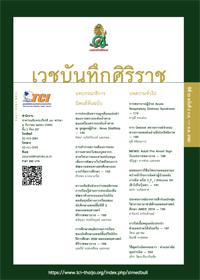ความสัมพันธ์ระหว่างพฤติกรรมการเรียนรู้ผ่านการประเมินเพื่อพัฒนาด้วยระบบออนไลน์กับผลสัมฤทธิ์ทางการเรียนของนักศึกษาแพทย์ชั้นปีที่ 3 คณะแพทยศาสตร์ศิริราชพยาบาล
Main Article Content
Abstract
วัตถุประสงค์: Formative assessment (evaluation) หรือ การประเมินเพื่อพัฒนา เป็นวิธีการที่มีประโยชน์ต่อการเรียนรู้ของนักศึกษา มีหลักการคือการให้ข้อมูลย้อนกลับเพื่อให้นักศึกษาได้พัฒนาการเรียนรู้ของตนเอง การประเมินเพื่อพัฒนาระบบออนไลน์ (online formative evaluation) มีข้อดี คือนักศึกษาได้รับข้อมูลย้อนกลับอย่างทันท่วงทีและเป็นรายบุคคล ทีมผู้วิจัยจึงได้ออกแบบโปรแกรมออน์ไลน์เพื่อนำมาใช้ในการเรียนวิชาพยาธิวิทยา หัวข้อ Diseases of the stomach สำหรับนักศึกษาแพทย์ชั้นปีที่ 3 ปีการศึกษา 2558 เพื่อศึกษาความสัมพันธ์ระหว่างพฤติกรรมการเรียนรู้ผ่าน online formative evaluation กับผลสัมฤทธิ์ในการเรียนของนักศึกษาแพทย์
วิธีการ: นักศึกษาถูกแบ่งเป็น 3 กลุ่มตามช่วงเวลาที่เข้าไปศึกษาโปรแกรม ได้แก่ นักศึกษาที่เข้าร่วมกิจกรรมโดยไม่ต้องเตือน นักศึกษาที่เข้าร่วมกิจกรรมหลังจากมีการแจ้งเตือน และ นักศึกษาที่ไม่เข้าร่วมกิจกรรมตามกำหนดเวลา จากนั้นเปรียบเทียบคะแนนสอบในหัวข้อการสอนที่มีและไม่มีโปรแกรม online formative evaluation ระหว่างนักศึกษาทั้งสามกลุ่ม
ผลการศึกษา: หัวข้อการสอนที่มีโปรแกรม online formative evaluation ได้แก่หัวข้อ Diseases of the stomach หัวข้อการสอนที่ไม่มีโปรแกรมดังกล่าว ได้แก่หัวข้อ Diseases of the intestine และหัวข้อ Diseases of the liver นักศึกษาที่เข้าร่วมกิจกรรมโดยไม่ต้องเตือน มีค่าเฉลี่ยคะแนนสอบสูงกว่า นักศึกษาที่เข้าร่วมกิจกรรมหลังจากมีการแจ้งเตือน และ นักศึกษาที่เข้าร่วมกิจกรรมหลังกำหนดเวลา อย่างมีนัยสำคัญทางสถิติ คะแนนเฉลี่ยคิดเป็นร้อยละ 91.29, 82.13 และ 80.26 ตามลำดับ (p=0.001) ในหัวข้อ Diseases of the stomach คะแนนเฉลี่ยคิดเป็นร้อยละ 85.52, 77.78 และ 67.25 ตามลำดับ (p=0.003) ในหัวข้อ Diseases of the intestine และคะแนนเฉลี่ยคิดเป็นร้อยละ 80.30, 76.33 และ 66.67 ตามลำดับ(p=0.023) ในหัวข้อ Diseases of the liver คะแนนเฉลี่ยของนักศึกษาทั้งชั้นในหัวข้อที่มี online formative evaluation สูงกว่าหัวข้อที่ไม่มี online formative evaluation อย่างมีนัยสำคัญทางสถิติ คะแนนเฉลี่ยคิดเป็นร้อยละ 82.97, 76.89 และ 76.16 ตามลำดับ (p=0.000)
สรุป: นักศึกษาที่มีพฤติกรรมการเรียนรู้ที่มีวินัยบ่งได้จากการเข้าร่วมกิจกรรมโดยไม่ต้องเตือน ทำคะแนนสอบได้สูงกว่ากลุ่มอื่นในทุกหัวข้อ แม้กระทั่งในหัวข้อที่ไม่มี formative evaluation และในภาพรวมนั้น หัวข้อที่มี formative evaluation มีคะแนนสอบเฉลี่ยสูงกว่าหัวข้อที่ไม่มี อย่างมีนัยสำคัญทางสถิติ
Correlation between learning discipline through online formative evaluation and learning achievement of the third year medical students
Ananya Pongpaibul, M.D.*, Pratuang Naksit, B.Sc.**, Sunan Meetess, M.Ed.**
*Department of Pathology, **Office of Medical Education, Faculty of Medicine Siriraj Hospital, Mahidol University, Bangkok 10700, Thailand.
Objective: Formative assessment (evaluation) is used to improve learning by identification of knowledge gap and then feedback to the learners. Online formative evaluation provides instant individual feedback. We developed a program “online formative evaluation” for third-year medical student and aimed to study the correlation between learning discipline and learning achievement.
Methods: The third-year medical students were categorized into three groups based on login date to the program; (1) login before reminder, (2) login after reminder and (3) login after the deadline. Summative examination score from the topic with and without online formative evaluation among three groups was compared.
Results: For the topic with online formative evaluation (Diseases of the stomach), summative examination score of group 1 was significantly higher than those of group 2 and 3; 91.29%, 82.13%, and 80.26%, respectively (p=0.001). For the topic without formative evaluation (Diseases of the intestine, Disease of the liver), summative examination scores of group 1 were also significantly higher than those of group 2 and 3; 85.52%, 77.78% and 67.25%, respectively (p=0.003) and 80.30%, 76.33% and 66.67, respectively (p=0.023). Average summative examination score of all students was higher on the topic with formative evaluation than the topic without formative evaluation; 82.97%, 76.89%, and 76.16%, respectively (p=0.000).
Conclusion: Students with learning discipline, attending formative evaluation before reminder, had higher examination scores on all topics. Students performed better on the topic with formative evaluation.


